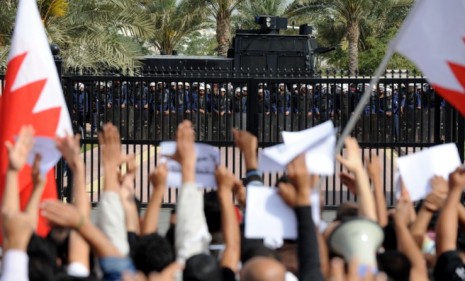Where's America's outrage over Bahrain?
Many Americans are gnashing their teeth over Moammar Gadhafi's near-crushing of Libya's armed rebellion, but yawning over U.S. ally Bahrain's crackdown on peaceful protests

A free daily email with the biggest news stories of the day – and the best features from TheWeek.com
You are now subscribed
Your newsletter sign-up was successful
So concerned is the U.N. about the Libyan situation that it authorized a no-fly zone (and, possibly, further military intervention) to stop Libyan dictator Moammar Gadhafi from crushing the armed rebels. Yet, Bahrain's routing of its peaceful protestors provoked nothing more from the U.N. than a statement of "deepest concern" over "reports of excessive and indiscriminate use of force... against unarmed civilians." Meanwhile, American pundits urging military intervention in Libya have little to say about U.S. ally Bahrain. Does the U.S. have a double standard for democracy?
The U.S. needs to take a stand: "It is heartbreaking to see a renegade country like Libya shoot pro-democracy protesters," says Nicholas Kristof in The New York Times. "But it's even more wrenching to watch America's ally, Bahrain, pull a Gadhafi," using U.S. weapons to crush a pro-democracy movement "as we stay mostly silent." In this fight between our values and our ally, we need to stand up tall for our values.
The Week
Escape your echo chamber. Get the facts behind the news, plus analysis from multiple perspectives.

Sign up for The Week's Free Newsletters
From our morning news briefing to a weekly Good News Newsletter, get the best of The Week delivered directly to your inbox.
From our morning news briefing to a weekly Good News Newsletter, get the best of The Week delivered directly to your inbox.
Obama has to tread carefully: The U.S. may very well want change in Bahrain, says David Ignatius in The Washington Post. But that understated desire has already sparked "the most important U.S.-Saudi disagreement in decades." Bahrain chose to follow their fellow Sunni monarchy's advice, bringing in Saudi and UAE troops to crush the rebellion. If the Gulf monarchies fall, that's a big crisis, "even by Middle East standards." Obama has to very carefully find a path that "doesn’t destabilize the Gulf and the global economy."
Gadhafi's survival prevents U.S. pressure in Bahrain: The Gulf monarchies are "ignoring Washington's advice to reform and avoid confrontation," says Greg Sheridan in The Australian. But since it now looks like Gadhafi may survive, and the "Arab spring" will not, the U.S.-Bahrain tiff will remain merely a "polite disagreement." Because really, "Gadhafi licenses Bahrain," with this "unanswerable question" to Washington: "If you cannot get rid of Gadhafi, why should you get rid of us?"
"Dictator cuts short the Arab spring"
A free daily email with the biggest news stories of the day – and the best features from TheWeek.com
-
 Film reviews: ‘Wuthering Heights,’ ‘Good Luck, Have Fun, Don’t Die,’ and ‘Sirat’
Film reviews: ‘Wuthering Heights,’ ‘Good Luck, Have Fun, Don’t Die,’ and ‘Sirat’Feature An inconvenient love torments a would-be couple, a gonzo time traveler seeks to save humanity from AI, and a father’s desperate search goes deeply sideways
-
 Political cartoons for February 16
Political cartoons for February 16Cartoons Monday’s political cartoons include President's Day, a valentine from the Epstein files, and more
-
 Regent Hong Kong: a tranquil haven with a prime waterfront spot
Regent Hong Kong: a tranquil haven with a prime waterfront spotThe Week Recommends The trendy hotel recently underwent an extensive two-year revamp
-
 The billionaires’ wealth tax: a catastrophe for California?
The billionaires’ wealth tax: a catastrophe for California?Talking Point Peter Thiel and Larry Page preparing to change state residency
-
 Bari Weiss’ ‘60 Minutes’ scandal is about more than one report
Bari Weiss’ ‘60 Minutes’ scandal is about more than one reportIN THE SPOTLIGHT By blocking an approved segment on a controversial prison holding US deportees in El Salvador, the editor-in-chief of CBS News has become the main story
-
 Has Zohran Mamdani shown the Democrats how to win again?
Has Zohran Mamdani shown the Democrats how to win again?Today’s Big Question New York City mayoral election touted as victory for left-wing populists but moderate centrist wins elsewhere present more complex path for Democratic Party
-
 Millions turn out for anti-Trump ‘No Kings’ rallies
Millions turn out for anti-Trump ‘No Kings’ ralliesSpeed Read An estimated 7 million people participated, 2 million more than at the first ‘No Kings’ protest in June
-
 Ghislaine Maxwell: angling for a Trump pardon
Ghislaine Maxwell: angling for a Trump pardonTalking Point Convicted sex trafficker's testimony could shed new light on president's links to Jeffrey Epstein
-
 The last words and final moments of 40 presidents
The last words and final moments of 40 presidentsThe Explainer Some are eloquent quotes worthy of the holders of the highest office in the nation, and others... aren't
-
 The JFK files: the truth at last?
The JFK files: the truth at last?In The Spotlight More than 64,000 previously classified documents relating the 1963 assassination of John F. Kennedy have been released by the Trump administration
-
 'Seriously, not literally': how should the world take Donald Trump?
'Seriously, not literally': how should the world take Donald Trump?Today's big question White House rhetoric and reality look likely to become increasingly blurred